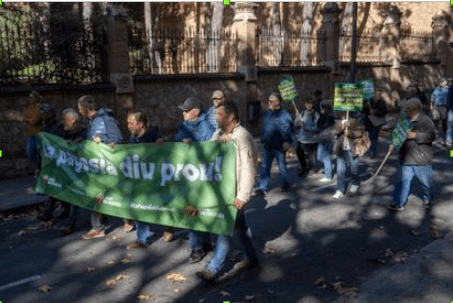Burning stubble is prohibited: New waste law triggers unrest in rural Spain
In a significant move towards environmental sustainability, a new law has been enacted in Alpujarra prohibiting open burns of organic materials. This legislation aims to address the growing concerns of air pollution, wildfire risks, and environmental degradation caused by traditional burning practices.
The Implications of the New Law
The prohibition of burns marks a transformative shift in agricultural and waste management practices within the region. For years, farmers have relied on burning organic waste as a quick and cost-effective method to clear land and dispose of residues. However, this practice has had detrimental effects on air quality and has contributed to the risk of wildfires, particularly in the dry, hot months.
Promoting Alternatives
With the ban in place, there is a significant push towards adopting more sustainable methods of managing organic waste. One of the leading alternatives being promoted is the use of BioChar production through pyrolysis. This process not only provides a solution for waste management but also creates a valuable soil amendment that enhances soil fertility and carbon sequestration.
Community Involvement and Education
Implementing the new law successfully requires robust community involvement and education. Local authorities and environmental organizations are launching campaigns to inform residents and farmers about the benefits of sustainable waste management practices and how to transition away from burning. Workshops, demonstrations, and incentives for adopting new technologies are part of the strategy to ensure a smooth transition.
The Role of Sierra Preta
Sierra Preta, an organization dedicated to promoting BioChar and sustainable agriculture, is at the forefront of these efforts. By providing resources, training, and support, Sierra Preta aims to help the community adapt to the new regulations while improving the health of the local ecosystem. Their initiatives include expanding BioChar kiln operations, conducting educational workshops, and fostering partnerships to enhance the adoption of sustainable practices.
Looking Ahead
The prohibition of burns in Alpujarra is a pivotal step towards a more sustainable future. By embracing innovative solutions like BioChar production, the region can reduce its environmental impact, improve air quality, and promote healthier agricultural practices. As the community rallies around these changes, Alpujarra is set to become a model for other regions seeking to balance traditional practices with modern environmental stewardship.
Conclusion
The new law prohibiting burns in Alpujarra is more than a regulatory change; it is a call to action for sustainable transformation. Through community effort, education, and innovative alternatives, Alpujarra is paving the way for a greener, healthier future.
For more information on sustainable practices and how to get involved, visit Sierra Preta.

